Unit 5 Do you want to watch a game show Section A 知识点精讲学案
文档属性
| 名称 | Unit 5 Do you want to watch a game show Section A 知识点精讲学案 | 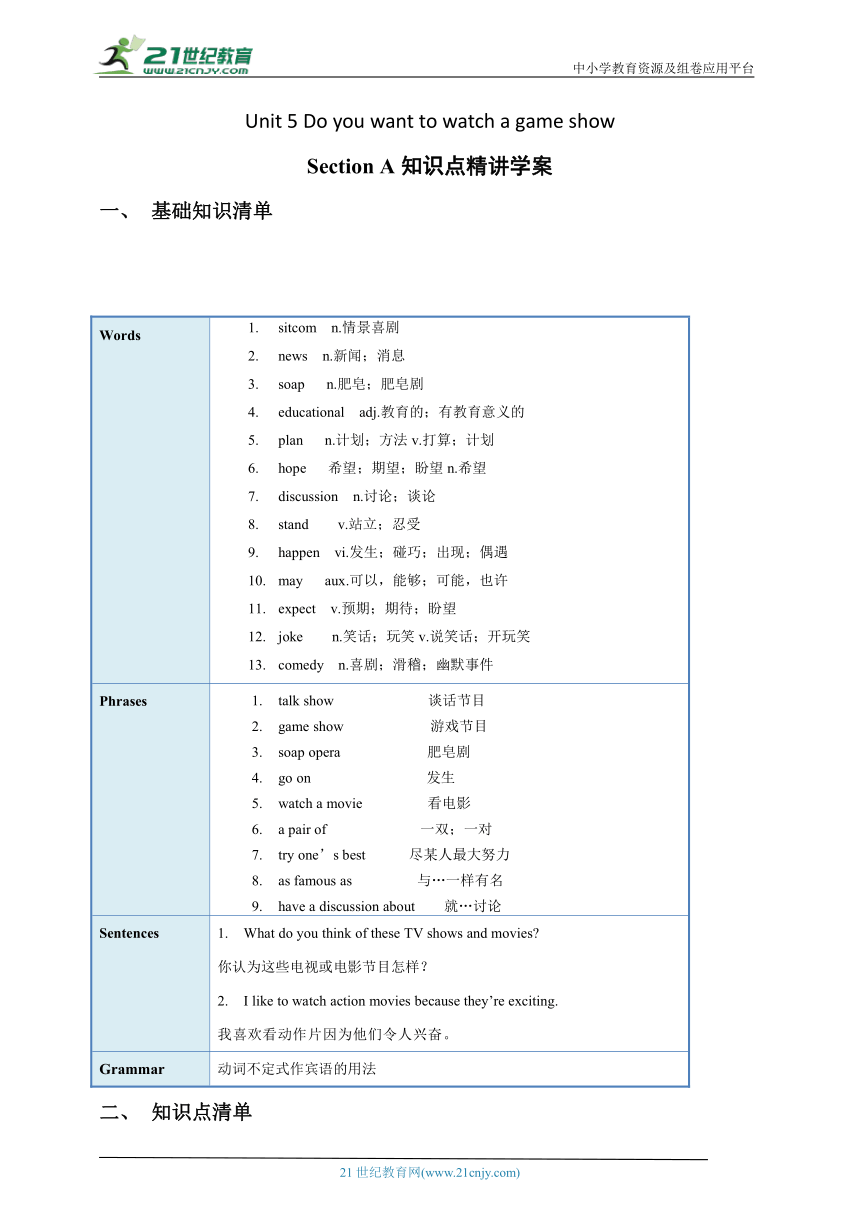 | |
| 格式 | docx | ||
| 文件大小 | 1.3MB | ||
| 资源类型 | 试卷 | ||
| 版本资源 | 人教新目标(Go for it)版 | ||
| 科目 | 英语 | ||
| 更新时间 | 2023-11-25 17:06:45 | ||
图片预览

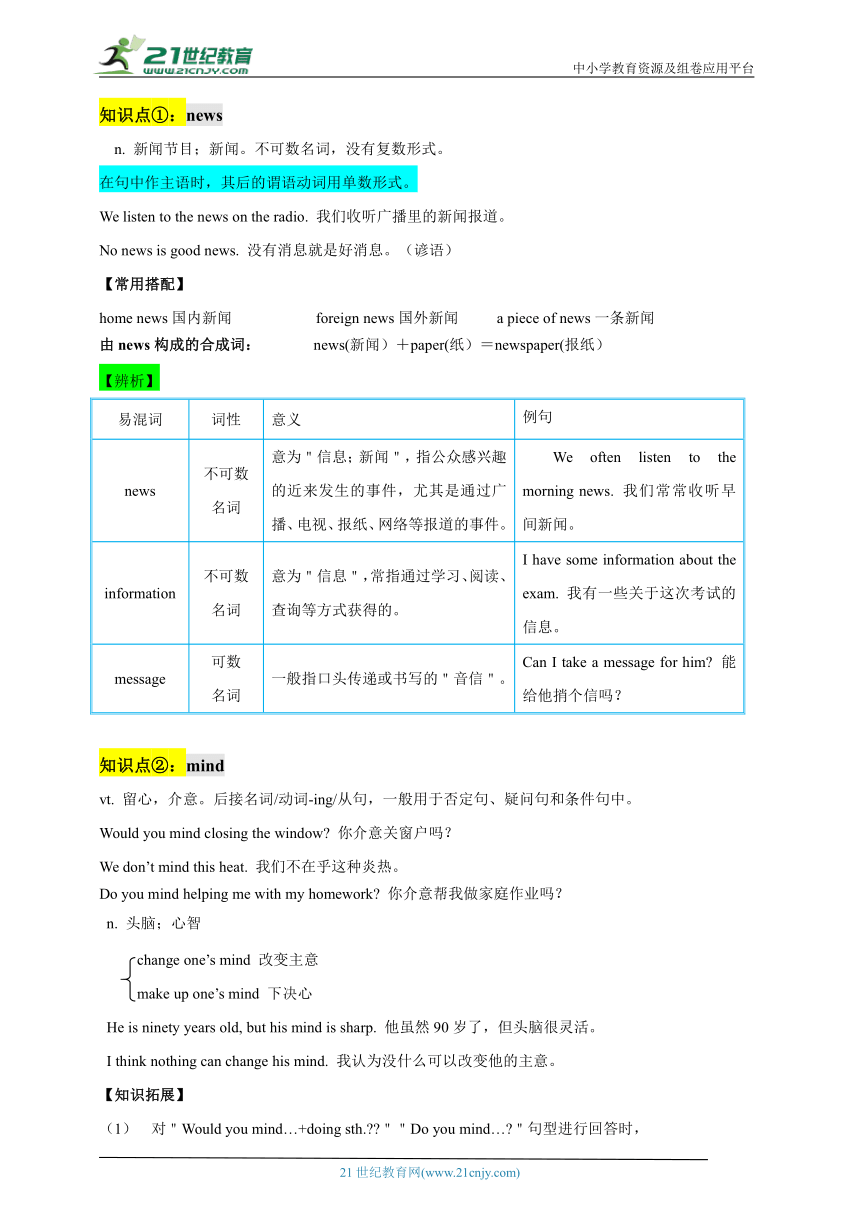
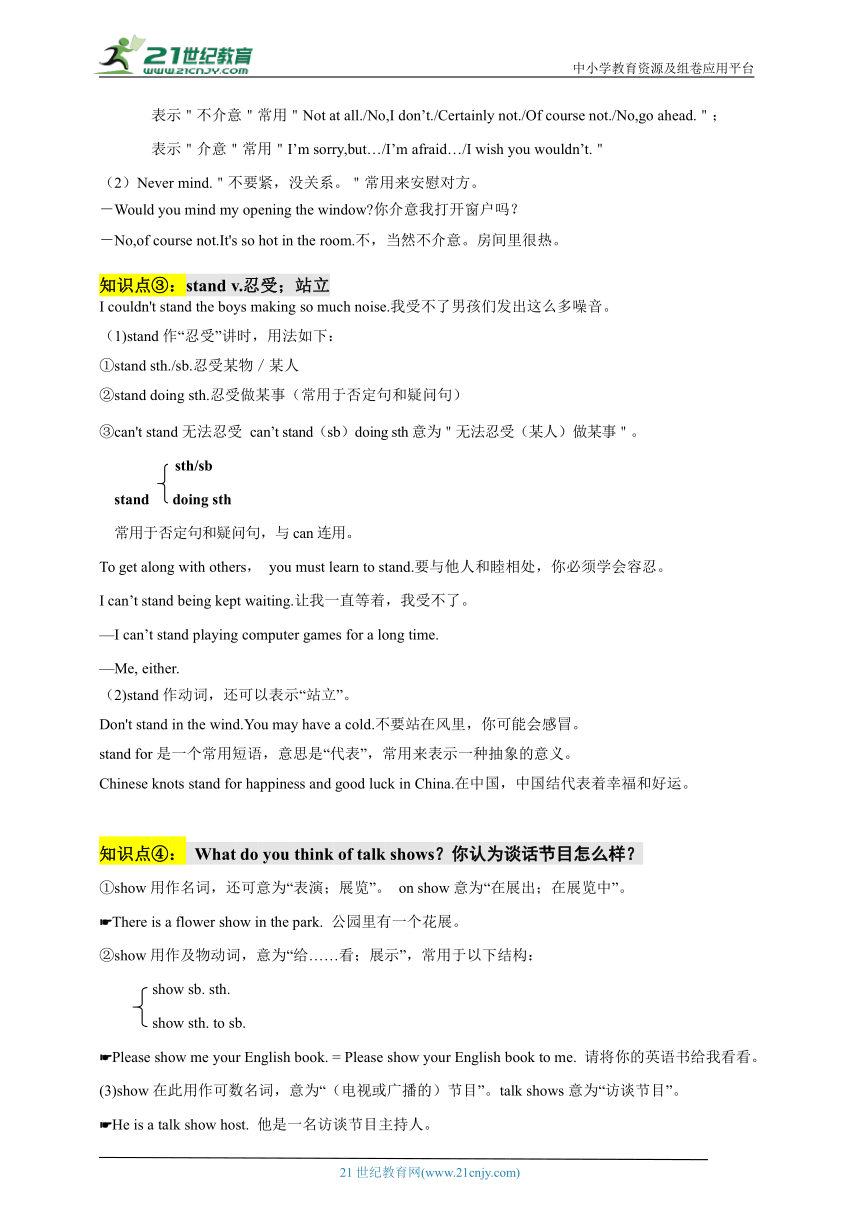
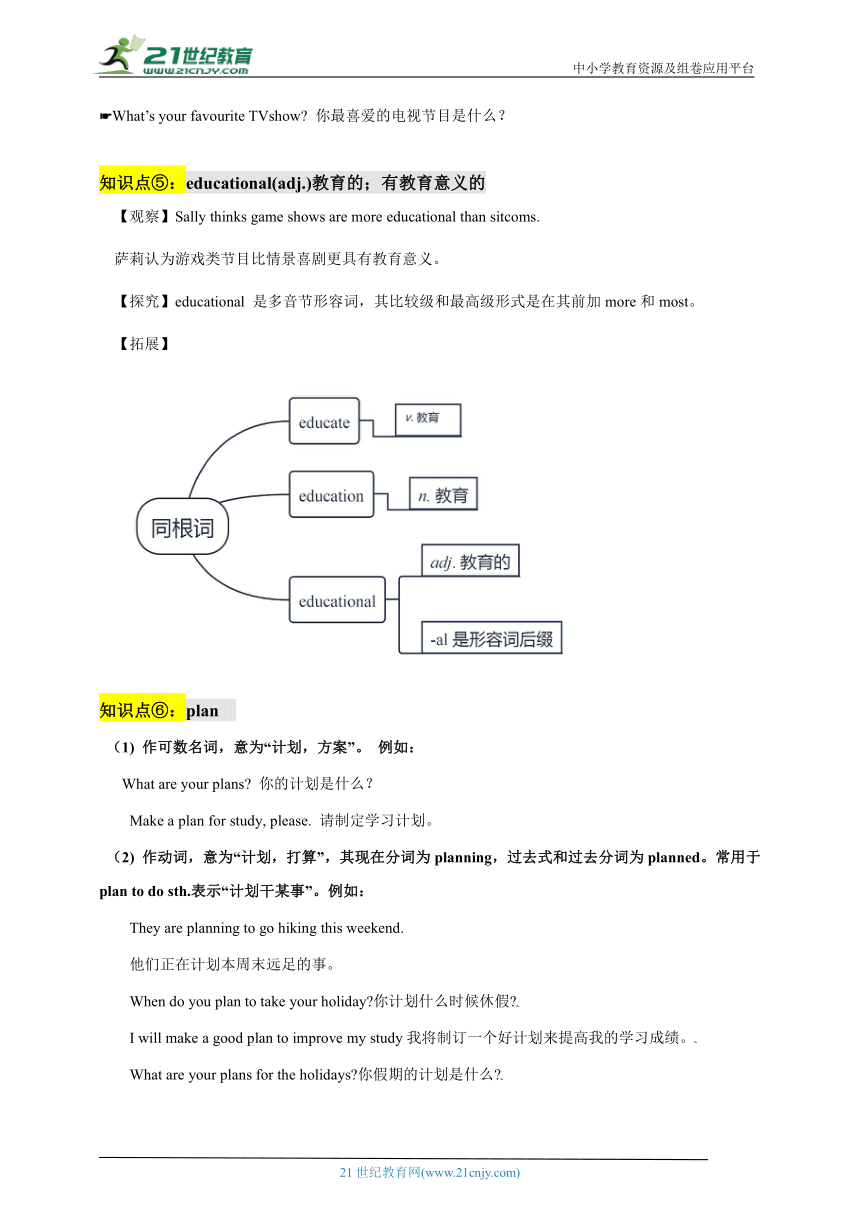
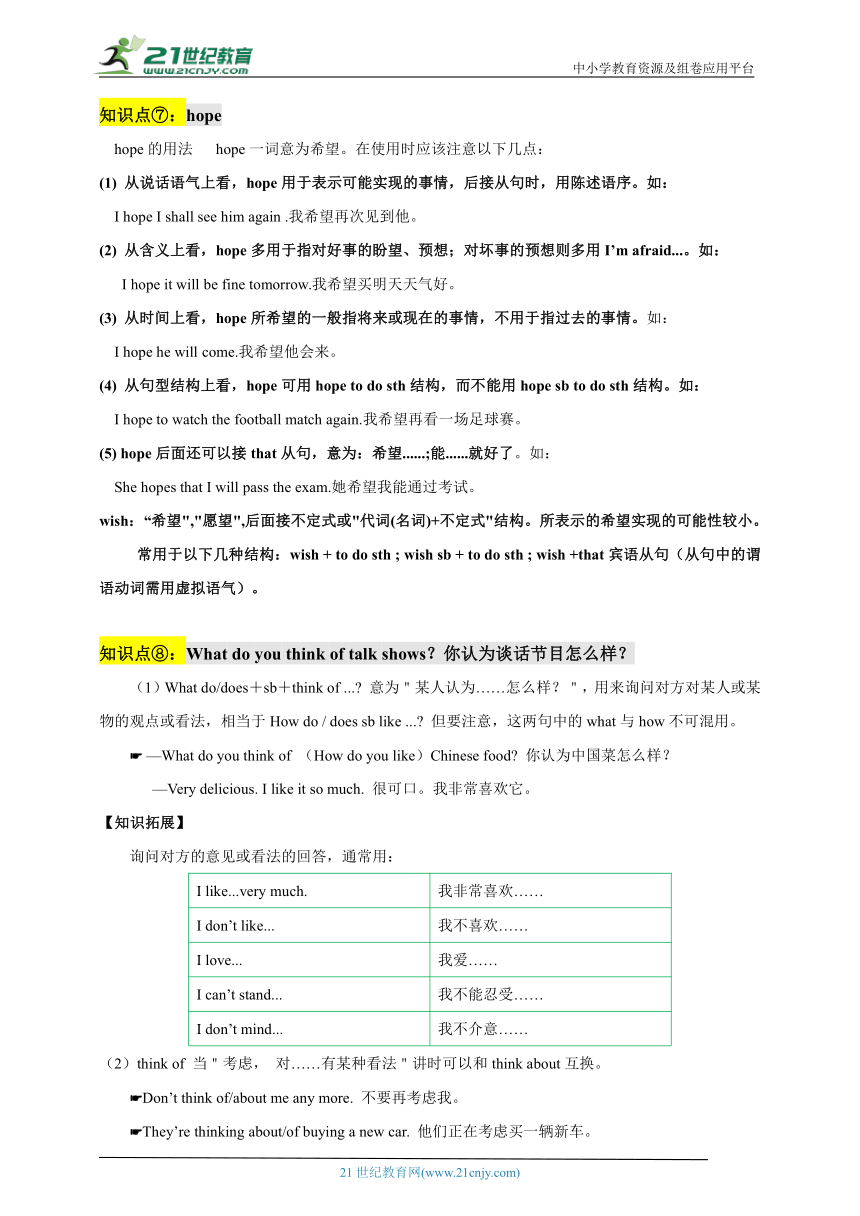
文档简介
中小学教育资源及组卷应用平台
Unit 5 Do you want to watch a game show
Section A知识点精讲学案
基础知识清单
Words 1. sitcom n.情景喜剧 2. news n.新闻;消息 3. soap n.肥皂;肥皂剧 4. educational adj.教育的;有教育意义的 5. plan n.计划;方法v.打算;计划 6. hope 希望;期望;盼望n.希望 7. discussion n.讨论;谈论 8. stand v.站立;忍受 9. happen vi.发生;碰巧;出现;偶遇 10. may aux.可以,能够;可能,也许 11. expect v.预期;期待;盼望 12. joke n.笑话;玩笑v.说笑话;开玩笑 edy n.喜剧;滑稽;幽默事件
Phrases 1. talk show 谈话节目 2. game show 游戏节目 3. soap opera 肥皂剧 4. go on 发生 5. watch a movie 看电影 6. a pair of 一双;一对 7. try one’s best 尽某人最大努力 8. as famous as 与…一样有名 9. have a discussion about 就…讨论
Sentences What do you think of these TV shows and movies 你认为这些电视或电影节目怎样? I like to watch action movies because they’re exciting. 我喜欢看动作片因为他们令人兴奋。
Grammar 动词不定式作宾语的用法
知识点清单
知识点①:news
n. 新闻节目;新闻。不可数名词,没有复数形式。
在句中作主语时,其后的谓语动词用单数形式。
We listen to the news on the radio. 我们收听广播里的新闻报道。
No news is good news. 没有消息就是好消息。(谚语)
【常用搭配】
home news国内新闻 foreign news国外新闻 a piece of news一条新闻
由news构成的合成词: news(新闻)+paper(纸)=newspaper(报纸)
【辨析】
易混词 词性 意义 例句
news 不可数名词 意为"信息;新闻",指公众感兴趣的近来发生的事件,尤其是通过广播、电视、报纸、网络等报道的事件。 We often listen to the morning news. 我们常常收听早间新闻。
information 不可数名词 意为"信息",常指通过学习、阅读、查询等方式获得的。 I have some information about the exam. 我有一些关于这次考试的信息。
message 可数 名词 一般指口头传递或书写的"音信"。 Can I take a message for him 能给他捎个信吗?
知识点②:mind
vt. 留心,介意。后接名词/动词-ing/从句,一般用于否定句、疑问句和条件句中。
Would you mind closing the window 你介意关窗户吗?
We don’t mind this heat. 我们不在乎这种炎热。
Do you mind helping me with my homework 你介意帮我做家庭作业吗?
n. 头脑;心智
change one’s mind 改变主意
make up one’s mind 下决心
He is ninety years old, but his mind is sharp. 他虽然90岁了,但头脑很灵活。
I think nothing can change his mind. 我认为没什么可以改变他的主意。
【知识拓展】
对"Would you mind…+doing sth. ""Do you mind… "句型进行回答时,
表示"不介意"常用"Not at all./No,I don’t./Certainly not./Of course not./No,go ahead.";
表示"介意"常用"I’m sorry,but…/I’m afraid…/I wish you wouldn’t."
(2)Never mind."不要紧,没关系。"常用来安慰对方。
-Would you mind my opening the window 你介意我打开窗户吗?
-No,of course not.It's so hot in the room.不,当然不介意。房间里很热。
知识点③:stand v.忍受;站立
I couldn't stand the boys making so much noise.我受不了男孩们发出这么多噪音。
(1)stand作“忍受”讲时,用法如下:
①stand sth./sb.忍受某物/某人
②stand doing sth.忍受做某事(常用于否定句和疑问句)
③can't stand无法忍受 can’t stand(sb)doing sth意为"无法忍受(某人)做某事"。
sth/sb
stand doing sth
常用于否定句和疑问句,与can连用。
To get along with others, you must learn to stand.要与他人和睦相处,你必须学会容忍。
I can’t stand being kept waiting.让我一直等着,我受不了。
—I can’t stand playing computer games for a long time.
—Me, either.
(2)stand作动词,还可以表示“站立”。
Don't stand in the wind.You may have a cold.不要站在风里,你可能会感冒。
stand for是一个常用短语,意思是“代表”,常用来表示一种抽象的意义。
Chinese knots stand for happiness and good luck in China.在中国,中国结代表着幸福和好运。
知识点④: What do you think of talk shows?你认为谈话节目怎么样?
①show用作名词,还可意为“表演;展览”。 on show意为“在展出;在展览中”。
There is a flower show in the park. 公园里有一个花展。
②show用作及物动词,意为“给……看;展示”,常用于以下结构:
show sb. sth.
show sth. to sb.
Please show me your English book. = Please show your English book to me. 请将你的英语书给我看看。
(3)show在此用作可数名词,意为“(电视或广播的)节目”。talk shows意为“访谈节目”。
He is a talk show host. 他是一名访谈节目主持人。
What’s your favourite TVshow 你最喜爱的电视节目是什么?
知识点⑤:educational(adj.)教育的;有教育意义的
【观察】Sally thinks game shows are more educational than sitcoms.
萨莉认为游戏类节目比情景喜剧更具有教育意义。
【探究】educational 是多音节形容词,其比较级和最高级形式是在其前加more和most。
【拓展】
知识点⑥:plan
(1) 作可数名词,意为“计划,方案”。 例如:
What are your plans 你的计划是什么?
Make a plan for study, please. 请制定学习计划。
(2) 作动词,意为“计划,打算”,其现在分词为planning,过去式和过去分词为planned。常用于plan to do sth.表示“计划干某事”。例如:
They are planning to go hiking this weekend.
他们正在计划本周末远足的事。
When do you plan to take your holiday 你计划什么时候休假
I will make a good plan to improve my study我将制订一个好计划来提高我的学习成绩。
What are your plans for the holidays 你假期的计划是什么
知识点⑦:hope
hope的用法 hope一词意为希望。在使用时应该注意以下几点:
(1) 从说话语气上看,hope用于表示可能实现的事情,后接从句时,用陈述语序。如:
I hope I shall see him again .我希望再次见到他。
(2) 从含义上看,hope多用于指对好事的盼望、预想;对坏事的预想则多用I’m afraid...。如:
I hope it will be fine tomorrow.我希望买明天天气好。
(3) 从时间上看,hope所希望的一般指将来或现在的事情,不用于指过去的事情。如:
I hope he will come.我希望他会来。
(4) 从句型结构上看,hope可用hope to do sth结构,而不能用hope sb to do sth结构。如:
I hope to watch the football match again.我希望再看一场足球赛。
(5) hope后面还可以接that从句,意为:希望......;能......就好了。如:
She hopes that I will pass the exam.她希望我能通过考试。
wish:“希望","愿望",后面接不定式或"代词(名词)+不定式"结构。所表示的希望实现的可能性较小。
常用于以下几种结构:wish + to do sth ; wish sb + to do sth ; wish +that宾语从句(从句中的谓语动词需用虚拟语气)。
知识点⑧:What do you think of talk shows?你认为谈话节目怎么样?
(1)What do/does+sb+think of ... 意为"某人认为……怎么样?",用来询问对方对某人或某物的观点或看法,相当于How do / does sb like ... 但要注意,这两句中的what与how不可混用。
—What do you think of (How do you like)Chinese food 你认为中国菜怎么样?
—Very delicious. I like it so much. 很可口。我非常喜欢它。
【知识拓展】
询问对方的意见或看法的回答,通常用:
I like...very much. 我非常喜欢……
I don’t like... 我不喜欢……
I love... 我爱……
I can’t stand... 我不能忍受……
I don’t mind... 我不介意……
(2)think of 当"考虑, 对……有某种看法"讲时可以和think about互换。
Don’t think of/about me any more. 不要再考虑我。
They’re thinking about/of buying a new car. 他们正在考虑买一辆新车。
What do you think of about the film 你认为那部影片怎么样?
【知识拓展】
(1)think of 还可意为"认为,想起"等。后跟名词、代词、动名词等。 She will smile when she thinks of her good friends. 当她想起她的好朋友时她就会微笑。 (2)think over意为"仔细考虑"。 Think over, and you’ll find a way. 仔细考虑一下,你就会有办法的。
知识点⑨:find out 查明; 弄清
指通过调查、研究等方式查明事情的真相,后面常跟宾语从句。
Did they find out where the old man lived 他们查明那位老人住在哪里了吗?
辨析:
find 意为"找到;发现",强调动作的结果。
look for意为"寻找",强调寻找的过程。
Mr. Li found his lost keys in the library. 李老师在图书馆里找到了他丢失的钥匙
He is looking for his wallet. 他正在找他的钱包。
知识点10:happen v. 发生; 出现
不及物动词,后面不能跟宾语,常用句式:
sth happened to sb 某人发生了什么事(常指不好的事)
sth happened+ 地点/时间,意为"某地/某时发生了某事"
An accident happened on Park Street.事故发生在公园街。
【知识拓展】
happen v. 碰巧,常用于 sb happened to do sth某人碰巧做某事 It happened that... I happened to read the story, so I can tell them the truth. 碰巧我读过那个故事,所以我能告诉他们事实真相。
【易混辨析】happen/take place
相同点:都意为"发生",都为不及物动词,都不可用于被动语态。
不同点: happen指具体客观事件发生,有偶然性,未能预见。
take place尤指根据安排或计划发生,含有事先预料或计划的意思。
When did the accident happen 事故什么时候发生的?
When will the wedding take place 婚礼什么时候举行?
知识点11:expect
【用法】
知识点12:luck
【用法】
语法清单
语法:动词不定式作宾语的用法
含义
动词不定式是由“to+动词原形”构成的,它是非谓语动词的一种。
动词不定式在句子中不能单独作谓语,也没有人称和数的变化,其否定结构是“not to +动词原形”。本单元重点学习不定式作宾语和宾语补足语的基本用法。
二、不定式作宾语
1.常见的后面可以接不定式作宾语的动词有agree,choose,decide,expect,fail,hope,learn,prepare,offer,plan,promise,refuse,want,wish等。
My cousin hopes to get good grades in the math exam.
我表弟希望在数学考试中取得好成绩。
Jack wants to buy some flowers for Mr. Wu.
杰克想给吴老师买些花。
2.what,which,who,where,when,how等特殊疑问词和不定式连用,在句中起名词的作用,可以作宾语。
He doesn't know what to do next.
他不知道接下来做什么。
Sam knows how to cook Chinese food.
萨姆知道怎么做中餐。
三、不定式作宾语补足语
1.常见的后面可以接不定式作宾语补足语的动词有allow,ask,encourage(鼓励),expect,invite,teach,tell,want,warn,wish等。
对应的搭配形式是:
The policeman asked us not to play football in the street.
那位警察不让我们在街道上踢足球。
The teacher told us to do Exercise One.
老师告诉我们做练习一。
2.使役动词let,make,have和感官动词see,hear,watch,notice,feel等词后接不带to的不定式作宾语补足语。
We often hear him sing on the playground.
我们经常听见他在操场上唱歌。
四、不定式的其他用法
作主语 To ask the teacher for help is necessary.=It is necessary to ask the teacher for help. 向老师寻求帮助是必要的。
作表语 My hobby is to listen to music.我的爱好是听音乐。
作定语 I have nothing to do today.今天我没什么事可做。
作状语 Later he left home to work in different cities.后来他离开家到不同的城市工作。
21世纪教育网 www.21cnjy.com 精品试卷·第 2 页 (共 2 页)
21世纪教育网(www.21cnjy.com)
Unit 5 Do you want to watch a game show
Section A知识点精讲学案
基础知识清单
Words 1. sitcom n.情景喜剧 2. news n.新闻;消息 3. soap n.肥皂;肥皂剧 4. educational adj.教育的;有教育意义的 5. plan n.计划;方法v.打算;计划 6. hope 希望;期望;盼望n.希望 7. discussion n.讨论;谈论 8. stand v.站立;忍受 9. happen vi.发生;碰巧;出现;偶遇 10. may aux.可以,能够;可能,也许 11. expect v.预期;期待;盼望 12. joke n.笑话;玩笑v.说笑话;开玩笑 edy n.喜剧;滑稽;幽默事件
Phrases 1. talk show 谈话节目 2. game show 游戏节目 3. soap opera 肥皂剧 4. go on 发生 5. watch a movie 看电影 6. a pair of 一双;一对 7. try one’s best 尽某人最大努力 8. as famous as 与…一样有名 9. have a discussion about 就…讨论
Sentences What do you think of these TV shows and movies 你认为这些电视或电影节目怎样? I like to watch action movies because they’re exciting. 我喜欢看动作片因为他们令人兴奋。
Grammar 动词不定式作宾语的用法
知识点清单
知识点①:news
n. 新闻节目;新闻。不可数名词,没有复数形式。
在句中作主语时,其后的谓语动词用单数形式。
We listen to the news on the radio. 我们收听广播里的新闻报道。
No news is good news. 没有消息就是好消息。(谚语)
【常用搭配】
home news国内新闻 foreign news国外新闻 a piece of news一条新闻
由news构成的合成词: news(新闻)+paper(纸)=newspaper(报纸)
【辨析】
易混词 词性 意义 例句
news 不可数名词 意为"信息;新闻",指公众感兴趣的近来发生的事件,尤其是通过广播、电视、报纸、网络等报道的事件。 We often listen to the morning news. 我们常常收听早间新闻。
information 不可数名词 意为"信息",常指通过学习、阅读、查询等方式获得的。 I have some information about the exam. 我有一些关于这次考试的信息。
message 可数 名词 一般指口头传递或书写的"音信"。 Can I take a message for him 能给他捎个信吗?
知识点②:mind
vt. 留心,介意。后接名词/动词-ing/从句,一般用于否定句、疑问句和条件句中。
Would you mind closing the window 你介意关窗户吗?
We don’t mind this heat. 我们不在乎这种炎热。
Do you mind helping me with my homework 你介意帮我做家庭作业吗?
n. 头脑;心智
change one’s mind 改变主意
make up one’s mind 下决心
He is ninety years old, but his mind is sharp. 他虽然90岁了,但头脑很灵活。
I think nothing can change his mind. 我认为没什么可以改变他的主意。
【知识拓展】
对"Would you mind…+doing sth. ""Do you mind… "句型进行回答时,
表示"不介意"常用"Not at all./No,I don’t./Certainly not./Of course not./No,go ahead.";
表示"介意"常用"I’m sorry,but…/I’m afraid…/I wish you wouldn’t."
(2)Never mind."不要紧,没关系。"常用来安慰对方。
-Would you mind my opening the window 你介意我打开窗户吗?
-No,of course not.It's so hot in the room.不,当然不介意。房间里很热。
知识点③:stand v.忍受;站立
I couldn't stand the boys making so much noise.我受不了男孩们发出这么多噪音。
(1)stand作“忍受”讲时,用法如下:
①stand sth./sb.忍受某物/某人
②stand doing sth.忍受做某事(常用于否定句和疑问句)
③can't stand无法忍受 can’t stand(sb)doing sth意为"无法忍受(某人)做某事"。
sth/sb
stand doing sth
常用于否定句和疑问句,与can连用。
To get along with others, you must learn to stand.要与他人和睦相处,你必须学会容忍。
I can’t stand being kept waiting.让我一直等着,我受不了。
—I can’t stand playing computer games for a long time.
—Me, either.
(2)stand作动词,还可以表示“站立”。
Don't stand in the wind.You may have a cold.不要站在风里,你可能会感冒。
stand for是一个常用短语,意思是“代表”,常用来表示一种抽象的意义。
Chinese knots stand for happiness and good luck in China.在中国,中国结代表着幸福和好运。
知识点④: What do you think of talk shows?你认为谈话节目怎么样?
①show用作名词,还可意为“表演;展览”。 on show意为“在展出;在展览中”。
There is a flower show in the park. 公园里有一个花展。
②show用作及物动词,意为“给……看;展示”,常用于以下结构:
show sb. sth.
show sth. to sb.
Please show me your English book. = Please show your English book to me. 请将你的英语书给我看看。
(3)show在此用作可数名词,意为“(电视或广播的)节目”。talk shows意为“访谈节目”。
He is a talk show host. 他是一名访谈节目主持人。
What’s your favourite TVshow 你最喜爱的电视节目是什么?
知识点⑤:educational(adj.)教育的;有教育意义的
【观察】Sally thinks game shows are more educational than sitcoms.
萨莉认为游戏类节目比情景喜剧更具有教育意义。
【探究】educational 是多音节形容词,其比较级和最高级形式是在其前加more和most。
【拓展】
知识点⑥:plan
(1) 作可数名词,意为“计划,方案”。 例如:
What are your plans 你的计划是什么?
Make a plan for study, please. 请制定学习计划。
(2) 作动词,意为“计划,打算”,其现在分词为planning,过去式和过去分词为planned。常用于plan to do sth.表示“计划干某事”。例如:
They are planning to go hiking this weekend.
他们正在计划本周末远足的事。
When do you plan to take your holiday 你计划什么时候休假
I will make a good plan to improve my study我将制订一个好计划来提高我的学习成绩。
What are your plans for the holidays 你假期的计划是什么
知识点⑦:hope
hope的用法 hope一词意为希望。在使用时应该注意以下几点:
(1) 从说话语气上看,hope用于表示可能实现的事情,后接从句时,用陈述语序。如:
I hope I shall see him again .我希望再次见到他。
(2) 从含义上看,hope多用于指对好事的盼望、预想;对坏事的预想则多用I’m afraid...。如:
I hope it will be fine tomorrow.我希望买明天天气好。
(3) 从时间上看,hope所希望的一般指将来或现在的事情,不用于指过去的事情。如:
I hope he will come.我希望他会来。
(4) 从句型结构上看,hope可用hope to do sth结构,而不能用hope sb to do sth结构。如:
I hope to watch the football match again.我希望再看一场足球赛。
(5) hope后面还可以接that从句,意为:希望......;能......就好了。如:
She hopes that I will pass the exam.她希望我能通过考试。
wish:“希望","愿望",后面接不定式或"代词(名词)+不定式"结构。所表示的希望实现的可能性较小。
常用于以下几种结构:wish + to do sth ; wish sb + to do sth ; wish +that宾语从句(从句中的谓语动词需用虚拟语气)。
知识点⑧:What do you think of talk shows?你认为谈话节目怎么样?
(1)What do/does+sb+think of ... 意为"某人认为……怎么样?",用来询问对方对某人或某物的观点或看法,相当于How do / does sb like ... 但要注意,这两句中的what与how不可混用。
—What do you think of (How do you like)Chinese food 你认为中国菜怎么样?
—Very delicious. I like it so much. 很可口。我非常喜欢它。
【知识拓展】
询问对方的意见或看法的回答,通常用:
I like...very much. 我非常喜欢……
I don’t like... 我不喜欢……
I love... 我爱……
I can’t stand... 我不能忍受……
I don’t mind... 我不介意……
(2)think of 当"考虑, 对……有某种看法"讲时可以和think about互换。
Don’t think of/about me any more. 不要再考虑我。
They’re thinking about/of buying a new car. 他们正在考虑买一辆新车。
What do you think of about the film 你认为那部影片怎么样?
【知识拓展】
(1)think of 还可意为"认为,想起"等。后跟名词、代词、动名词等。 She will smile when she thinks of her good friends. 当她想起她的好朋友时她就会微笑。 (2)think over意为"仔细考虑"。 Think over, and you’ll find a way. 仔细考虑一下,你就会有办法的。
知识点⑨:find out 查明; 弄清
指通过调查、研究等方式查明事情的真相,后面常跟宾语从句。
Did they find out where the old man lived 他们查明那位老人住在哪里了吗?
辨析:
find 意为"找到;发现",强调动作的结果。
look for意为"寻找",强调寻找的过程。
Mr. Li found his lost keys in the library. 李老师在图书馆里找到了他丢失的钥匙
He is looking for his wallet. 他正在找他的钱包。
知识点10:happen v. 发生; 出现
不及物动词,后面不能跟宾语,常用句式:
sth happened to sb 某人发生了什么事(常指不好的事)
sth happened+ 地点/时间,意为"某地/某时发生了某事"
An accident happened on Park Street.事故发生在公园街。
【知识拓展】
happen v. 碰巧,常用于 sb happened to do sth某人碰巧做某事 It happened that... I happened to read the story, so I can tell them the truth. 碰巧我读过那个故事,所以我能告诉他们事实真相。
【易混辨析】happen/take place
相同点:都意为"发生",都为不及物动词,都不可用于被动语态。
不同点: happen指具体客观事件发生,有偶然性,未能预见。
take place尤指根据安排或计划发生,含有事先预料或计划的意思。
When did the accident happen 事故什么时候发生的?
When will the wedding take place 婚礼什么时候举行?
知识点11:expect
【用法】
知识点12:luck
【用法】
语法清单
语法:动词不定式作宾语的用法
含义
动词不定式是由“to+动词原形”构成的,它是非谓语动词的一种。
动词不定式在句子中不能单独作谓语,也没有人称和数的变化,其否定结构是“not to +动词原形”。本单元重点学习不定式作宾语和宾语补足语的基本用法。
二、不定式作宾语
1.常见的后面可以接不定式作宾语的动词有agree,choose,decide,expect,fail,hope,learn,prepare,offer,plan,promise,refuse,want,wish等。
My cousin hopes to get good grades in the math exam.
我表弟希望在数学考试中取得好成绩。
Jack wants to buy some flowers for Mr. Wu.
杰克想给吴老师买些花。
2.what,which,who,where,when,how等特殊疑问词和不定式连用,在句中起名词的作用,可以作宾语。
He doesn't know what to do next.
他不知道接下来做什么。
Sam knows how to cook Chinese food.
萨姆知道怎么做中餐。
三、不定式作宾语补足语
1.常见的后面可以接不定式作宾语补足语的动词有allow,ask,encourage(鼓励),expect,invite,teach,tell,want,warn,wish等。
对应的搭配形式是:
The policeman asked us not to play football in the street.
那位警察不让我们在街道上踢足球。
The teacher told us to do Exercise One.
老师告诉我们做练习一。
2.使役动词let,make,have和感官动词see,hear,watch,notice,feel等词后接不带to的不定式作宾语补足语。
We often hear him sing on the playground.
我们经常听见他在操场上唱歌。
四、不定式的其他用法
作主语 To ask the teacher for help is necessary.=It is necessary to ask the teacher for help. 向老师寻求帮助是必要的。
作表语 My hobby is to listen to music.我的爱好是听音乐。
作定语 I have nothing to do today.今天我没什么事可做。
作状语 Later he left home to work in different cities.后来他离开家到不同的城市工作。
21世纪教育网 www.21cnjy.com 精品试卷·第 2 页 (共 2 页)
21世纪教育网(www.21cnjy.com)
同课章节目录
- Unit 1 Where did you go on vacation?
- Section A
- Section B
- Unit 2 How often do you exercise?
- Section A
- Section B
- Unit 3 I'm more outgoing than my sister.
- Section A
- Section B
- Unit 4 What's the best movie theater?
- Section A
- Section B
- Unit 5 Do you want to watch a game show?
- Section A
- Section B
- Unit 6 I'm going to study computer science.
- Section A
- Section B
- Unit 7 Will people have robots?
- Section A
- Section B
- Unit 8 How do you make a banana milk shake?
- Section A
- Section B
- Unit 9 Can you come to my party?
- Section A
- Section B
- Unit 10 If you go to the party, you'll have a grea
- Section A
- Section B
